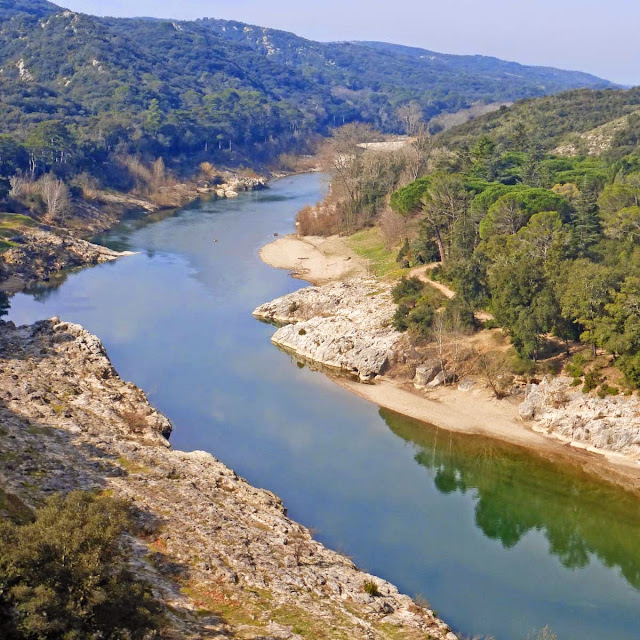Pont du Gard, Roman Heritage in Provence ©Solange Hando
As part of the canalisations designed to bring water from the springs below Uzès to the city of Nîmes, it was in use for around 500 years, the most impressive of the many works along the 50 km route which followed the contour of the hills.
Ancient Olive Tree in the Garrigue near the Roman Aqueduct ©Solange Hando
The site is a top tourist attraction with a fascinating interactive museum, boutiques and refreshments but you cannot see any of this from the aqueduct or vice-versa.
Everything here has been planned to show the aqueduct at its most impressive, out in the wilderness, just as it was, where ancient olive trees rise above the fragrant Mediterranean scrub. You can follow a trail through the garrigue or along the river to enjoy different views of this superb Roman monument, with little to disturb the peace but the sound of crickets and birds.
The River Gard from the Aqueduct ©Solange Hando
Most visitors walk across the aqueduct on the lower level to enjoy superb views of the Gard, lined with white rocks and tiny beaches and framed by wooded hills and rambling trails.
Others prefer to canoe right under the bridge and for those who like it a little spooky, there are guided visits inside the canalisation.
Listed Building on the Bank ©Solange Hando
But it's always a relief to get back out into the sunshine and gaze at the river and the lonely listed buildings on its banks, the former mill (above) and the old post office across the water.
In dry weather, the Gard is a placid ribbon of pure blue water but in heavy rain, it floods its banks and creeps up the lower archways of the Pont relentlessly. So the valley has many moods, from scenic and romantic to untamed and dangerously wild.
Peeping through the Garrigue ©Solange Hando
Alongside its Roman heritage, Pont du Gard is a dynamic site where cultural events are staged year round, including exhibitions and sound and light shows, most exciting this year for the World Heritage 30th anniversary
All are designed to highlight the aqueduct, giving it new life in the modern world and true to UNESCO's philosophy, preserving culture by strengthening the link between past and present.





Very nice blog and great pictures. I will be seeing next entries.
ReplyDeleteEveryone is invited to see my blog entries at this address